Okay, this is for all you fly-flingers who when you are trying to
follow the drift of a size #26 ant or beetle fly, have to lean way forward,
face nearly on the water, squinting like an owl, looking into the bright sun.
From July until the beginning of Winter, ants and beetles are deadly
on the streams I fish. I love them, but what I don't love is not being
able to see the tiny critters.
Oh, I know, there have been all sorts of things that are meant to
increase visibility, from huge spots of paint on top, to parachute ties with
two foot white posts, to the Chernobyl Ant. I have tried them all, and have
found them all to be lacking in something, especially the Chernobyl Ant! I
know they catch fish, but you can't prove it by me. The ants
around my favorite streams don't look like they were built from spare
'Leggo' pieces, and I have actually seen trout laughing at them as they
drift by.
Being a traditional fur and feather kind of guy, I never really cared for
closed-cell foam, except for the fact that it floats like a cork. Although I
have caught a lot of trout on submerged ants and beetles, I have caught a
whole lot more on those that float.
I have found by doing some fine slicing, closed-cell foam can be
nicely used for really small ants and beetles that don't look like 'Leggo's.'
The problem with visibility is still there! I have come up with something
that works for me, and thought some of you might appreciate this tip.
(there is a great foam-cutting device in
Save on Scud and Shrimp Backs in Archive of Tying Tips.)
Here is what I do:
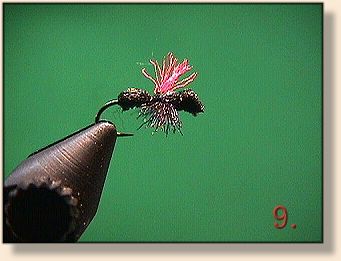
Ant Recipe
Hook: Standard Dry Fly hook (size #18 thru #26).
Thread: Black (8/0 or smaller).
Body: Black Closed-cell Foam (thinly sliced).
Brush Flag: Red Antron (threaded onto a needle).
Legs: Black Antron (threaded onto a needle).
Instructions:
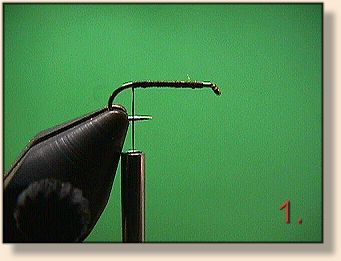
1. For really small ants (18 thru 26) I tie in at the eye of the hook with
fine thread, laying a thread base all the way to the bend of the hook.
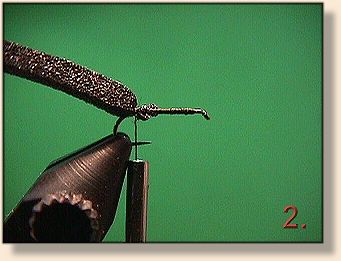
2. I then tie-in a proportionately thin strip of black closed-cell
foam on bend, with the strip extending toward the rear.
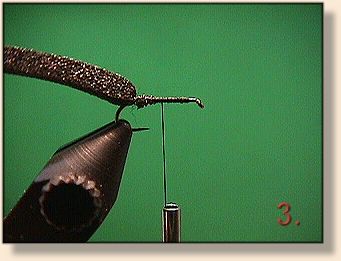
3. Leaving the foam at the bend of the hook, I wrap the thread forward,
to mid-section of the hooks shaft.
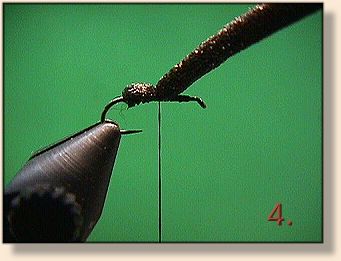
4. Bring the foam forward, and tie it down near mid-point
of the hooks shaft, to form a neat, trim abdomen. If you
stretch the foam a bit, you will get a oval shape. Ants don't have
bodies shaped like concrete blocks.
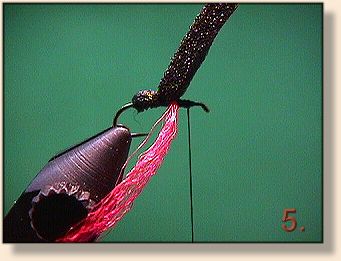
5. Now, it is time for the 'Flag Brush,' made out of Red Antron yarn.
Cut a piece of Antron Brush out the Red Antron, separating into strips
that are the thickness shown. Thread a common sewing needle with an appropriately
sized strip of Red Antron thread for the size ant I am tying.
Wetting the end of the Antron yarn, I tie the yarn on top of the hook,
right at the forward end of the waist. Do a few wraps up and back down the yarn.
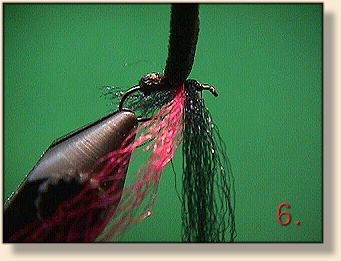
6. Now cut a piece of Black Antron. Brush it out, separating it into strips of
appropriate thickness for the size hook. Tie in the Black Antron 'legs' tight against
the front of the Red Antron post, in a crisscross spinner-wing fashion.
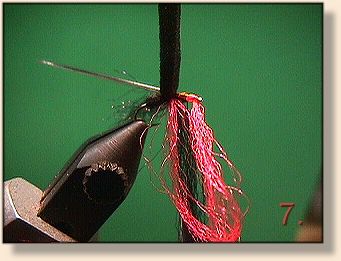
7. Pulling the foam strip back, pierce the foam with the needle, pulling the Red Antron thru.
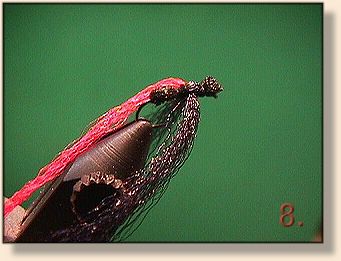
8. Pull the foam forward and tie down to form a thorax. Clip the remaining foam tight to the thread, form a head, and whip-finish.

9. Clip the Red Antron post, so that it frizzes out just right. Then clip
the Black Antron legs, on both sides to the right size. The Antron legs look much more like ant legs, and it saves precious black hackle. View from the top below.
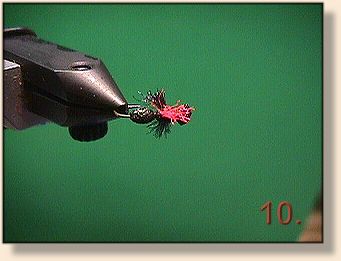
This little ant floats like a cork! I had a real ant crawl up and investigate one of them lying on my knee while I was tying on a new piece of tippet (seriously). Last Sunday, eleven brown trout were positive they were the "real thing!"
Please check out the Fly Tying Section, on the
Bulletin Board, on FAOL too.
If you have any questions, tips, or techniques; send them along.
Someone else thought up most of this material before we did,
they just forgot to tell anyone about it. Or else we just
forgot about it, while learning something else. Let us
share with each other, all the things we know!
~ Steven H.
McGarthwaite (Chat Room AKA Parnelli)
|











